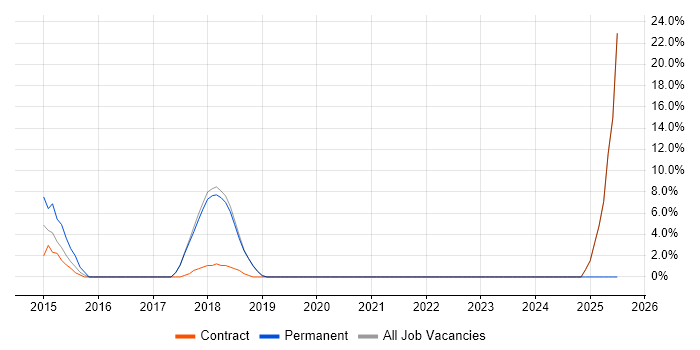The table below provides summary statistics for contract job vacancies advertised in Paddington requiring knowledge or experience of Splunk products and/or services. It includes a benchmarking guide to contractor rates offered in vacancies that cited Splunk over the 6 months leading up to 5 August 2025, comparing them to the same period in the previous two years.
The figures below represent the IT contractor job market in general and are not representative of contractor rates within Splunk, Inc.
|
|
6 months to
5 Aug 2025 |
Same period 2024 |
Same period 2023 |
| Rank |
6 |
- |
- |
| Rank change year-on-year |
- |
- |
- |
| Contract jobs citing Splunk |
1 |
0 |
0 |
| As % of all contract jobs advertised in Paddington |
5.00% |
- |
- |
| As % of the Vendors category |
9.09% |
- |
- |
| Number of daily rates quoted |
1 |
0 |
0 |
| Median daily rate (50th Percentile) |
£475 |
- |
- |
| City of Westminster median daily rate |
£475 |
£725 |
- |
| % change year-on-year |
-34.48% |
- |
- |
Splunk falls under the Vendor Products and Services category. For comparison with the information above, the following table provides summary statistics for all contract job vacancies requiring knowledge or experience of all vendor products and services in Paddington.
| Contract vacancies with a requirement for knowledge or experience of vendor products and services |
11 |
9 |
2 |
| As % of all contract IT jobs advertised in Paddington |
55.00% |
47.37% |
66.67% |
| Number of daily rates quoted |
4 |
8 |
2 |
| 10th Percentile |
£386 |
- |
£210 |
| 25th Percentile |
£403 |
£440 |
£291 |
| Median daily rate (50th Percentile) |
£450 |
£546 |
£430 |
| Median % change year-on-year |
-17.62% |
+27.03% |
- |
| 75th Percentile |
£556 |
£575 |
£566 |
| 90th Percentile |
£703 |
£613 |
£647 |
| City of Westminster median daily rate |
£600 |
£518 |
£544 |
| % change year-on-year |
+15.94% |
-4.83% |
+27.94% |

